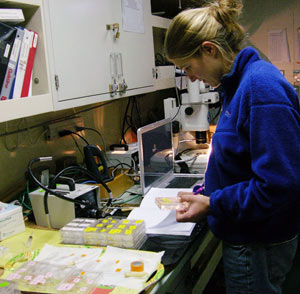Interviews
In the narrow microscope room of the Gould, graduate student Kelly Rakow examines many small samples in plastic trays called “well plates,” to see how long salps take to digest food, and how fast they are eating. (Photo by Kate Madin, WHOI)
We’ve now been on the L.M. Gould for over two weeks. Do you like being at sea?
I enjoy cruises. They are like nothing else. But I’m not really a boat person. I didn’t grow up around boats, and it’s just not in my blood.
How do you feel about diving?
Diving is what got me interested in marine science. I started diving when I was 13, at a camp on Catalina Island (California). Because I started so young, I’m very comfortable in the water, and that’s an advantage. I’ve been diving in many environments, and I actually enjoy the extra challenge of diving in this extreme environment. I like blue water diving much better than over the shallow bottom. It’s easier, actually, in the water, as long as your buoyancy is adjusted correctly so you aren’t too heavy or light. In warm water, it’s very peaceful. Here in Antarctica, though, it’s exciting!
Do you find night diving scary?
Well, it can be. Not because I’m concerned about sharks or leopard seals, but because it’s more difficult and more complicated—there’s definitely more excitement. There are all these things to worry about: night, the dry suit, the cold. It would be enough to think about for just a recreational dive. On top of it you have to work—you have to collect animals, and deliver! That’s a lot to think about at one time.
What are you doing on the cruise?
I’m one of the divers, so I go diving and collect salps, and help other people with the nets collecting, counting and measuring salps, and keeping track of how they digest their food. The important part for me is starting my research project on salps, starting to find out what will work with the salps and how to do what I want to do with them, which is to study how water flows around the salp when its swimming, how it brings diatoms to the salp to feed on, and how the feeding net works.
What were some of the other things you’ve done between college and here? What brings you here?
I was interested in jellies (gelatinous ocean animals) when I was in college, and I volunteered at the New England Aquarium, in the jellies culture facility, where they grow jellyfish for the displays. I guess I was in the right place at the right time, because the jelly curator was about to leave then, so right out of college I took that job at the New England Aquarium.
I was there three years, and I fell in love with jellies. I was surrounded by live jellies in tanks, where you could watch them move, not washed up on a beach. I had questions about them all the time, and I felt like trying to answer some of those questions so I got a master’s degree with Monty Graham at the Dauphin Island Sea Lab in Alabama. I worked on moon jellies (a kind of jellyfish) in the Gulf of Mexico, on swimming mechanics, and behavior in currents.
I went on two research cruises in the North Atlantic with Larry and Pat: these were the first blue water dives I’d ever done. That was when I realized I wanted to be a biological oceanographer. I was definitely hooked on blue water diving! Now I’m Larry’s student, in the second year of my studies at the Woods Hole Oceanographic Institution. This cruise is a great opportunity to work some research plans out, because salps can’t be collected at Woods Hole.
There must be places to get salps other than Antarctica.
It’s a challenge. The animals are not easy to get, so I’ll probably go on some more cruises in the Atlantic. The equipment to study what I want (the way water flows around swimming salps) is expensive, fancy, and not portable, but my long-term goal is to study water flows in the salps’ environment, underwater.
Other than science, what things do you like to do?
It depends on the time of year. Woods Hole (where I live) is a very seasonal place. I run, play soccer, kayak, and I like fishing. These are all summer things.
Is there more you’d like to add about this experience in Antarctica?
Going to Antarctica was on my “life list” of things I wanted to do, long before I knew about this cruise. It’s amazing to be able to do this so early in my career! It’s a wonderful opportunity.
|

